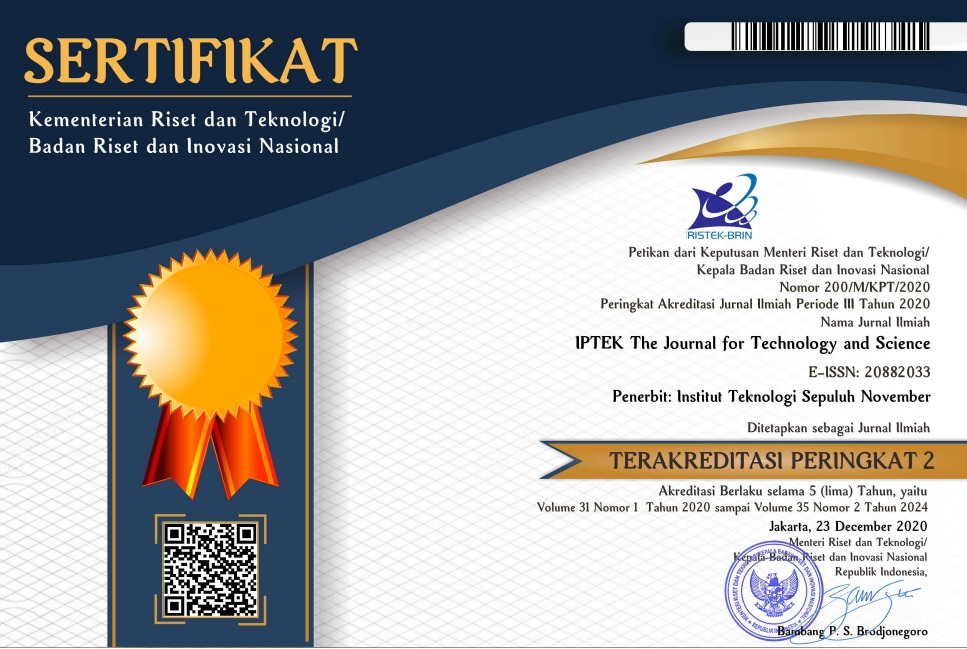The Effect of Water Contents to Diesel Fuel-Water Emulsion Fuel Stability
Abstract
Keywords
Full Text:
PDFReferences
I.A. Resitoglu, K. Altinisik, A. Keskin, “The pollutant emissions from diesel engine vehicles and exhaust after treatment systems, “Clean Technology Environment Policy, vol.17, pp. 15-27, 2015
A.K. Hassanuddin, M.I. Ahmad, M. Zahari, S.S. Mohd, A.B. Aiman, S.A. Aizam, J.Y. Wira, “Stability studies of water-in-diesel emulsion, “Applied Mechanics and Materials, vol.663, pp. 54-57, 2015
A.M. Ithnin, H. Noge, H.A. Kadis, W. Jazair, “An overview of utilizing water-in-diesel emulsion fuel in diesel engine and its potential research study, “J. Energy Institute, vol.87, pp. 1-16, 2014
M.Y. Khan, Z.A.A. Karim, F.Y. Hagos, A.R.A. Aziz, I.M. Tan, “Current trends in water-in-diesel emulsions as a fuel, “The Scientific World Journal, pp. 1-15, 2014
S. Vellaiyan, K.S. Amirthagadeswaran, The role of water-in-diesel emulsion and its additives on engine performance and emission levels: a retrospective review, Alexandria Engineering Journal, vol.55, pp. 2463-2472, 2016
A.M. Al-Sabagh, M.M. Emara, M.R.N. El Din, W.R. Aly, Formation of water-in-diesel oil nano-emulsions using high energy method and studying some of their surface active properties, Egyptian Journal of Petroleum vol. 20, pp. 17-23, 2011
M.R.N. El-Din, S.H. El-Hamouly, H.M. Mohammed, M.R. Mishrif, A.M. Ragab, Water-in-diesel fuel nanoemulsions: preparation, stability and physical properties, Egyptian Journal of Petroleum vol. 22, pp. 575-581, 2013
B.S. Bidita, A.R. Suraya, M.A. Shazed, M.A. Mohd-Salleh, A. Idris, Preparation, characterization, and engine performance of water in diesel nanoemulsions, Journal of Energy Institute, vol. 89, pp. 1-12, 2016
M.N. El-Din, D.I. Osman, A.M. Rashad, M.R. Mishrif, E.A. El-Sharaky, Physicochemical and rheological characterization of diesel fuel nanoemulsions at different water and surfactant contents, Journal of Molecular Liquids, vol. 231, pp. 440-450, 2017
M.G. Song, S.H. Cho, J.Y. Kim, J.D. Kim, Novel evaluation method for the water-in-oil (W/O) emulsion stability by turbidity ratio measurements, Korean Journal Chemical Engineering, vol. 19, pp. 425-430, 2002
DOI: http://dx.doi.org/10.12962%2Fj20882033.v30i2.4997
Refbacks
- There are currently no refbacks.
IPTEK Journal of Science and Technology by Lembaga Penelitian dan Pengabdian kepada Masyarakat, ITS is licensed under a Creative Commons Attribution-ShareAlike 4.0 International License.
Based on a work at https://iptek.its.ac.id/index.php/jts.


